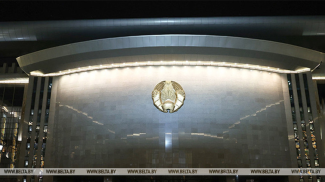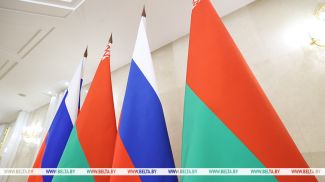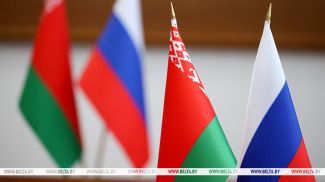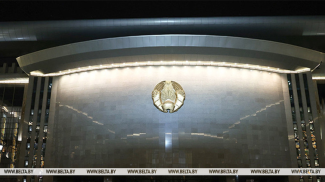Belarus President Aleksandr Lukashenko held a conference on 10 October to discuss security matters. It was a continuation of the conversation with representatives of defense, security, and law enforcement agencies held at premises of the Defense Ministry several days before. But this scheduled meeting was spiced up: the Crimean bridge had been blown up two days before the meeting and at the same time Belarus had started getting alarming reports concerning Ukraine's plans.
Against this backdrop the head of state made several important statements.
During the latest conference with representatives of defense, security, and law enforcement agencies Aleksandr Lukashenko stressed: “Through unofficial channels we were warned about strikes on Belarus from Ukraine's territory. It was stated: ‘We will do things that can be called Crimean Bridge 2'. I was immediately made aware of this information. My answer was simple: tell the president of Ukraine and other crazy people over there, if there are any left, that Crimean Bridge will look like a picnic to them if only they touch even one meter of our territory with their dirty hands! It is your function. Consider it an order for you.”
Even before that the president asked the military to be absolutely frank with Belarusians. The authorities refute rumors about mobilization, but citizens are receiving calls from military registration and enlistment offices. What's going on? How many NATO aircraft are patrolling the Belarusian borders? Why did Belarus study the concept of military security of the USA and the UK? And why is Belarus mobilized? We have a lot of questions and we will try to answer them as part of the project “After the fact: Decisions of the First One”.
Why is NATO afraid of Russia?
Admit it, do you believe that NATO is conducting psychological operations against Russia and Belarus? Or is it funny for you to read statements about puppet governments in neighboring countries? In order to understand the essence of today's events, we will have to briefly go back to the 1950s.
We have found a military security strategy dated by March 1950 on NATO's website. It is not some secret document. It can be found in a special historical selection on NATO's website. That year was a special one for the United States and the Soviet Union as it officially ended the American nuclear monopoly.
But what did the NATO strategy say? Hmm, it mentioned the Soviet Union. NATO believed that the USSR was preparing to conquer everything up to the Atlantic seaboard. That the USSR was getting ready to become the king of the Mediterranean and the Middle East. And the West was preparing for war. How? They were counting and keeping in mind their allies. They intended to pressure some allies like Israel. They intended to use force against other ones like Yugoslavia (do you remember what happened to the country in the end?). And NATO referred to the third kind such as Greece, Tьrkiye, and Iran as American Republics.
And of course, they were preparing to weaken the USSR, including with the help of psychological operations. No, they were not even preparing. They had guidelines for action. And it happened in 1950. What can we say about today? Everything has become even more complicated.
What goals does the West really have?
Can you guess what a new NATO strategy says? Yes, it mentions Russia. What does it not mention? China. Intelligence agencies and military experts believe that China is the main target of the United States.
At a recent meeting with reporters Chairman of the State Security Committee Ivan Tertel said: "For the West everything new is old. By and large, Carthage must be destroyed. Who is Carthage now? China. Carthage is China. Therefore, this whole situation that is unfolding in the world is ultimately aimed at resisting the growth of China."
But most amusing is the Alliance's statement about "commitment to a world where sovereignty, territorial integrity, human rights and international law are respected." And where "each country can choose its own path." They are so cute.
What is going on along Belarusian borders?
But let's get back to the topic of this episode. The West has its own score to settle with Belarus. And the West has had a score to settle for a long time: for a quarter of a century they have been hindered by the policy the country is pursuing. The situation along the Belarusian borders was recently discussed at a conference hosted by the head of state. The military say that a 35,000-strong force grouping of NATO troops remains in Europe. Most of it is in the countries Belarus borders on.
Andrei Chernobai, a military analyst with the Belarusian Institute for Strategic Research (BISR), commented on the current situation by saying: "Amid the special operation in Ukraine the United States has increased the number of its troops in Europe to 100,000 or even more. And about three fifths are here on a permanent basis."
The intensity of reconnaissance flights along the Belarusian borders is not decreasing. And the Lithuanian military training area in Pabrade (it's only 15km away from Belarus) is operating at its full capacity. But Poland demonstrates the highest activity after all. A new mechanized division and territorial defense brigades are being formed there. Interestingly, instead of supporting its population in a difficult socio-economic environment the Polish government plans to increase its military budget to 3% of the GDP and to 5% in the future. It is twice as much as what NATO countries are accustomed to.
Lithuania would also be glad to increase its military budget but it has no money to spare. As the saying goes, there is no money, but you should hold on. But the country has a powerful patron - NATO. And Vilnius asks the Alliance to deploy combat tactical groups in the country. Lithuania is also extremely interested in getting MLRS HIMARS. You know what is happening in Ukraine.
At a September meeting with the state secretary of the Security Council Aleksandr Lukashenko said: "The situation is very serious. I would even say dangerous. And we must not simplify things. There is no need to be afraid of anything. If we need to alert some army unit according to wartime standards, then we just have to do it. If we have to alert territorial defense troops, then we have to do it. If we need to check people's militia over there, on the spot, what kind of fighters we will have and what kind of weapons they have, then it means we have to do it.”
Will there be mobilization in Belarus?
The news of mobilization in Russia stirred up all the neighboring countries. Russians were particularly concerned about it since people had questions about the organization of reservist training events. Sometimes the army recalled to active service people without military training and sometimes the army recalled people, who are not exactly supposed to be recalled. The wave of alarm has also reached Belarus: after all, the republic is still a military ally of Russia and takes part in Russia's special military operation in Ukraine one way or another. The self-exiled opposition was quick to exploit the situation. Some of them were even promised the Nobel Peace Prize for their dreams of a forceful overthrow of the Belarusian government.
Ivan Tertel explained: "Why do they have such desires? A lot of money has been invested in them. No matter how hard our Western partners... opponents try to disguise it, we still know from which accounts specifically, through which funds they are getting it and where the money ends up. Yes, there is a serious corruption aspect over there. They demand only one thing from them. The other day there were several such gatherings along the lines: ‘Have you been paid? Show us what you can do!'"
"Lukashenko is preparing for war!" Multiple clickbait headlines like that started appearing on the Internet. And you know, reporters and bloggers broadcasting from the West have not lied this time. Although they told the truth by accident.
Aleksandr Lukashenko stated at that memorable conference: "If you want peace, you need to prepare for war. Always. All your life. If things turn out well, it will be good then. Therefore, in order to prevent any clashes and manifestations, we, military people, must have plans in advance to counter all kinds of scoundrels who are trying to get us into a fight."
So will there be mobilization in Belarus?
"The fact that they are trying to throw this bridge to us and say there will be mobilization in Belarus… There will be no mobilization. This is a lie. Briefly and clearly, this is a lie. We are not going to mobilize. We do not need it," the president said at a meeting with reporters in the WW2 memorial Khatyn. The policy has not changed since then.
Why are Belarusians getting summoned to military registration and enlistment offices?
Then why do we hear news lately that military registration and enlistment offices have started summoning Belarusians? Coincidence? The Defense Ministry explained everything.
Belarusian Defense Minister Viktor Khrenin said: "The Defense Ministry takes care of mobilization matters all the time, year after year. You know, our people are even used to it. Today, some kind of nervousness when a draft notice arrives and the person comes... Either in order to study his military registration specialty and he has to be in the military registration and enlistment office either for a test muster or a planned muster.”
The Defense Ministry stressed all the reservist training events are scheduled and have been stipulated by dedicated legislation in advance. Military registration and enlistment offices continue following their daily routine.
But the state secretary of the Security Council does not like to make excuses. In his words, mobilization does not apply to Belarus because the people are mobilized anyway. "We are ready to fight back with the appropriate forces and means," Aleksandr Volfovich said after meeting with his Russian counterpart.
Does NATO threaten Belarus?
The Belarusian authorities are doing their best to protect their citizens from the war. Aleksandr Lukashenko says that Belarus will not get involved in any war. Belarusians will fight only if they have to defend their native land, the head of state assures. Of course, no one even wants to discuss such a scenario, but… Geopolitical instability is growing in the world. Military activity is on the rise. NATO is building up force groupings in the Eastern European region.
In figures it looks like this: 35,000 military personnel in Eastern Europe, 2,000 aircraft. 15 warships in the Mediterranean Sea and the Baltic Sea. Including two nuclear submarines and one aircraft carrier. Over 300 sea and air-based cruise missiles. And all of this is allegedly aimed against the threat from the East. The Belarusian army registers about five flights of reconnaissance aircraft along the borders per day. The number of flights exceeds 30-35 per week.
Defense Minister Viktor Khrenin said: "Meanwhile, if the West launches military aggression, these aircraft and ships will be able to strike at our installations and troops across the entire territory of Belarus."
Why did Belarus decide to change the National Security Concept?
All these events prompted a fresh look at the National Security Concept. They want to thoroughly update the document and make it, as the president put it, "absolutely frank".
What does it mean? The head of state wants nothing hidden due to some political or economic reasons, but wants the document to honestly describe the existing risks and threats. As well as Belarus' reaction to them so that neighboring countries and other countries could properly assess the state of affairs. Truth be told, we do not know whether such frankness and honesty from the Belarusian side will help our neighbors. More than 20 years ago Belarus and Russia created a regional force grouping and all these years they have been actively and openly developing it. But now some countries are perplexed why Belarus supports Russia for some reason.
"In view of the aggravation on the western borders of the Union State, we have agreed to deploy the regional force grouping of the Russian Federation and the Republic of Belarus. This is all according to our documents," the president said on 10 October.
The government promised to submit the draft National Security Concept for public hearings. Just the way it was done for the new edition of the Constitution. Military experts and scientists studied the experience of the USA, Germany and the UK, countries of the post-Soviet space. And, of course, the National Security Strategy of Russia, which was published last year. But, according to statements of the state secretary of the Security Council, the Belarusian concept does not copy any of the documents of the neighboring countries. It absorbed all the changes that have taken place in the world over the course of 12 years.
The military analyst Andrei Chernobai remarked: “Of course, some of the threats the current concept mentions remain relevant. Nevertheless, new threats, new challenges that we could not foresee have appeared. This is evidenced by the pandemic that we faced in 2020, the migration crisis. We could not foresee events of this magnitude despite the fact that Belarus has always been a transit country for emigrants. There are also demographic issues, including the labor migration of our citizens to neighboring countries. The international legal system, the treaty system that ensured control over armaments, which made it possible to maintain security in the region, in Europe, in the world has essentially fallen apart."
There are certain economic risks, too.
Sergei Solodovnikov, Head of the Economy and Law Chair of Belarusian National Technical University, Candidate of Economic Sciences, professor, noted: "We now deal with an economy of risks. In other words, a large number of challenges, threats, phenomena that simply affect security, which we cannot predict in principle, have appeared. And they have an impact. Accordingly, in my opinion, the concept has made a successful attempt to foresee all this. First of all, authors of the concept (in addition to updating 70% of it) changed their approach to assessing socio-economic phenomena."
The concept outlines national interests more fully: those are national identity, historical truth, the social responsibility of citizens instead of simply the state, the development of nuclear energy, and the protection of personal data. Another sphere of security has appeared – biological security.
The government also wants to update another strategic document - the Military Doctrine. Both documents have to be approved by the Belarusian People's Congress.
“The goal of our Armed Forces and our defense, security, and law enforcement agencies is to protect our land and our state. That's it! We set no other goals today. And we are preparing for a war because all kinds of things may happen. If we had not persevered here in 2020, a different kind of armed forces would be deployed near Smolensk now. This is why we have to train and keep training all the time. We have to properly learn military business first and foremost,” Aleksandr Lukashenko said at the meeting with military personnel.
The president's words can be used as a good summary. The situation in the world and around Belarus is changing every day. You can have a hard time keeping up with it. What should we do in these conditions?
“People have already sensed that something is not okay, that there are some tensions, and so on. They wonder what should be done and how. I would like to repeat that everyone should continue doing their job,” the president said. “The current situation is not so bad that we need to start acting immediately. Our military will demonstrate at this point their determination to defend their country. Then no scoundrel will dare muscle in here.”
***The project has been created using the target fee for the production of national content.













